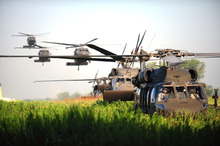By Deb Riechmann
The Afghan conflict generates barely a whisper on the US presidential campaign trail. It's not a hot topic at the office water cooler or in the halls of Congress even though more than 80,000 American troops are still fighting and dying at a rate of one a day.
This month, protesters at the Iowa State Fair chanted, "Stop the war!" They were referring to one purportedly being waged against the middle class.
By the time voters go to the polls in November to choose between Obama and presumptive Republican nominee Mitt Romney, the war will be in its 12th year. For most Americans, that's long enough.
Public opinion remains largely negative towards the war, with 66 per cent opposing it and just 27 per cent in favour in a May AP-GfK poll. More recently, a Quinnipiac University poll found that 60 per cent of registered voters felt the US should no longer be involved in Afghanistan. Just 31 per cent said the US was doing the right thing by fighting there now.
"We're bored with it," said Matthew Farwell, who served in the US Army for five years including 16 months in eastern Afghanistan, where he sometimes received letters from school students addressed to the brave Marines in Iraq - the wrong war.
"We all laugh about how no one really cares," he said. "All the 'support the troops' stuff is bumper sticker deep."
Farwell, 29, who is now studying at the University of Virginia, said the war was rarely a topic of conversation on campus and he isn't surprised that it's not discussed much on the campaign trail.
"No one understands how to extricate ourselves from the mess we have made there. So from a purely political point of view, I wouldn't be talking about it if I were Barack Obama or Mitt Romney either."
Ignoring the Afghan war, though, doesn't make it go away.
More than 1950 Americans have died in Afghanistan and thousands more have been wounded since President George W. Bush launched attacks on October 7, 2001, to rout al-Qaeda after it used Afghanistan to train recruits and plot the September 11 attacks that killed nearly 3000people.
Strangely, Afghanistan never seemed to grab the same degree of public and media attention as the war in Iraq, which Obama opposed as a "war of choice".
While most Americans are sympathetic to the plight of the Afghan people, they have become deeply sceptical of President Hamid Karzai's willingness to tackle corruption and political patronage and the coalition's chances of "budging a medieval society" into the modern world, says Ann Marlowe, a visiting fellow at the Hudson Institute, a policy research organisation in Washington.
"With millions of veterans home and talking with their families and friends ... some knowledge of just how hard this is has percolated down," said Marlowe, who has travelled to Afghanistan many times.
It has also been hard to show progress on the battlefield.
In July, 40 US service members died in Afghanistan in the deadliest month for American troops so far this year. At least 31 have been killed this month - seven when a helicopter crashed during a firefight with insurgents in what was one of the deadliest air disasters of the war. Ten others were gunned down in attacks by members of the Afghan security forces - either disgruntled turncoats or Taleban infiltrators.
Many argue that Osama bin Laden's death justifies a quick US exit from Afghanistan. Others say it's important to stay to shore up the Afghan security forces and help build the Government. An unstable Afghanistan could again provide sanctuary to militants who want to harm America and its allies, they say.
"Those of us who have been at this for a long time continue to think that it's important, and that we have a chance now of a path forward with a long-term perspective that will produce the results," said James Cunningham, the new US ambassador to Afghanistan.
Military analysts say the US envisions a post-2014 force of perhaps 20,000 to hunt terrorists, train the Afghan forces and keep an eye on neighbouring Iran and other regional powerhouse nations.
Americans aren't likely to know the number until later this year. But will anyone other than families of service personnel take note?

No comments:
Post a Comment